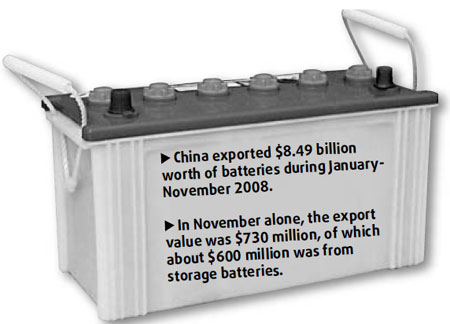
|
BIZCHINA> Top Biz News
 |
|
Rebates on cards for lead-acid battery exporters
By Wang Xing (China Daily)
Updated: 2009-02-11 08:04
 China's Ministry of Industry and Information Technology (MIIT) yesterday confirmed that it is considering a tax rebate for lead-acid battery exporters to stop them from laying off workers. "We are working on a report but there has been nothing conclusive yet," said an MIIT official who wished to remain anonymous. He said his team is waiting for industry figures from last year and will decide whether to propose the stimulus plan a few weeks after that.
The report said the global economic slowdown has forced one third of Chinese battery exporters in Guangdong, Fujian and Zhejiang provinces to halt production, citing Yi Xiaobo, an association official. It said about half of Chinese battery exporters are considering a move to foreign markets such as India and Vietnam where costs are lower, which is expected to result in as many as 200,000 layoffs. However, the MIIT official said China's battery industry is not as bad as is being reported. He said the export figures from September to November last year did not slump as much as earlier estimated. Lead-acid batteries are mostly used in autos and motorcycles. But sales of these products have been slashed by the global economic slowdown. MIIT figures show China's battery exports increased 17.6 percent in the first 11 months of 2008. But the growth was 4 percentage points lower than that of the first 10 months. Wang Zhengjie, general manager of Neata Battery Manufacture, a lead-acid battery company in Zhongshan, Guangdong province, said he has cut one-third of his 350 employees this year to counter the declining demand. But he said he did not expect the government to release supportive policies, and the severe market environment could help him cut out smaller competitors. As the world's largest battery producer, China called off the 15 percent export tax rebate in 2006 to curb the country's investment fever on high energy-consuming enterprises. But experts estimate that such a move, together with renminbi appreciation and rising raw material prices, has forced Chinese battery makers to endure 50 percent more costs than their foreign rivals. (For more biz stories, please visit Industries)
|
|||||
a级毛片av无码